
Man Can’t Understand Why He Didn’t Get Equal Inheritance, Gets A Reality Check From Sister
Interview With ExpertLosing a parent can be life-altering. You might suddenly find yourself without a support system, and the pain can be overwhelming. So most of us do everything that we can to honor our late loved one and respect their wishes. But when one woman’s brother started throwing a fit over what their mother left him, she had to give him a harsh reality check.
Below, you’ll find the full story that this woman recently posted on the “Am I the [Jerk]?” subreddit, as well as conversations with Katherine Fox, founder of Sunnybranch Wealth and financial advisor for inheritors, and Cody Barbo, CEO and founder of Trust & Will.
After losing her mother, this woman received the bulk of the family inheritance
Image credits: Álvaro Serrano / unsplash (not the actual photo)
And now, she’s been forced to explain to her brother why he didn’t receive as much as she did
Image credits: Marcus Aurelius / pexels (not the actual photo)
Image credits: Mikhail Nilov / pexels (not the actual photo)
Image credits: Suspicious-Round3708
“I often see siblings rehashing childhood fights and grievances under the cover of ‘arguing about an inheritance'”
To learn more about this situation, we got in touch with Katherine Fox, founder of Sunnybranch Wealth and financial advisor for inheritors. Katherine was kind enough to have a chat with Bored Panda and discuss how often issues like this come up in families.
“It is incredibly common for siblings to argue over an inheritance after a parent passes away. Even for siblings who receive an equal share of a parent’s inheritance, it isn’t uncommon to see relationship-altering fights,” Katherine shared. “The most common disagreements I see between siblings are like OPs story, where siblings aren’t given equal shares of their inheritance.”
“In some cases, it might be like OP’s situation – where her mom felt that ‘fair wasn’t equal’ because OP’s brother had access to a share of the family business. In other cases, siblings may be left out of their parent’s estate or given a smaller share for reasons that no one can understand,” the expert shared. “The feeling of being shorted or not receiving what you ‘deserve’ relative to your siblings is fuel for sibling disagreements.”
Katherine noted that many sibling disagreements over inheritance are rooted in decades-long conflicts. “Often, siblings treat each other nicely because of their parents’ (real or perceived) influence and wanting to keep the peace. When a parent dies, grief comes out and the gloves come off.”
“I often see siblings rehashing childhood fights and grievances under the cover of ‘arguing about an inheritance.’ Even when siblings receive equal shares of an inheritance, disagreements about what to do with inherited property or personal assets can be a source of huge tension.”
“Inheritance conflicts are often rooted in underlying feelings of favoritism, loyalty, betrayal, or unresolved family trauma”
We were also able to get in touch with Cody Barbo, CEO and founder of Trust & Will, to hear his thoughts on this situation. “It’s actually quite common for siblings to experience conflict over inheritance. The financial aspects of inheritance often sit atop deep, long-standing family dynamics and emotional memories that resurface after a parent’s passing,” the CEO shared. “Many disputes center around a perceived ‘fairness’ in the division of assets, whether that’s over money, property, or cherished personal items.”
“While the actual dollar amounts might seem like the issue, inheritance conflicts are often rooted in underlying feelings of favoritism, loyalty, betrayal, or unresolved family trauma,” Cody noted. “It’s not unusual to see siblings argue because one feels they sacrificed more for the family, or perhaps they feel more entitled due to closer proximity or a stronger relationship with the parent. As in this story, deep-seated family patterns and histories influence how people feel about ‘who gets what’—and why.”
We also asked the experts what advice they would give to anyone who’s currently in a similar situation.
“It isn’t your job to help your sibling accept this situation. They are sharing their reality with you. Whether or not you agree with their reality, you can’t deny that it is how they feel. You won’t be able to reason them out of the grief, hurt, and resentment they feel,” Katherine shared.
“The best thing you can do is try not to make the situation worse. In the post, OP throws the reason her brother didn’t inherit back in his face. I understand that she was also hurt by her treatment of their mom but, ultimately, she came out ahead in this situation. The best thing you can do to try and preserve sibling relationships is to adopt a neutral tone, acknowledge your sibling’s feelings, and remove yourself from the situation if it is too painful for you to listen to,” she explained.
“If you care about maintaining a long-term, healthy relationship with a sibling who received a lesser share of an inheritance from your parents, the worst thing you can do is tell them you think your parents were right. Even if that’s 100% how you feel,” the expert noted.
“Some parents find that discussing their estate plans with their children while they’re still alive helps pre-empt disputes”
Image credits: Andrea Piacquadio / pexels (not the actual photo)
Cody says that it’s important to remember that these conversations are often emotionally charged and that empathy can go a long way. “Allowing the sibling space to express their frustrations and feelings may help diffuse resentment,” he shared.
“However, they don’t owe anyone more than their parents intended to give. In these cases, sharing a copy of the estate plan documents can help clarify their parent’s wishes and demonstrate that the plan was crafted with intention,” Cody added. “If a sibling continues to dispute their inheritance, it may help to remind them that inheritance distribution isn’t about personal worth; rather, it reflects a parent’s perspective, which can sometimes be based on complex histories.”
“Acknowledging any pain they may feel can help the sibling feel seen and heard, even if they don’t necessarily agree with the outcome. The goal is to foster understanding and respect for the choices their parent made while gently holding boundaries,” he explained.
But thankfully, the experts say there are several proactive ways parents can reduce the likelihood of inheritance conflicts while they’re still around.
“As a financial advisor for inheritors, the number one MOST important thing families should do to minimize family conflicts after death is share their inheritance plans BEFORE anyone dies,” Katherine says. “In OPs case, her mom could have had a frank conversation with her brother about how she was structuring her estate plan. This conversation still would have been upsetting for him, but he would have had a chance to process and discuss with his mom before she was gone.”
“Getting an unpleasant surprise from a loved one after they die (like OP’s brother did) can forever shift how you remember that person. It’s not something anyone should have to go through,” the expert shared. “Siblings should focus on asking their parents questions about their estate plan and thoughts on inheritance distribution. And parents should be open to having these discussions with family members to preserve family harmony after they’re gone.”
“Good planning is as much about passing down peace and understanding as it is about passing down property”
Image credits: RDNE Stock project / pexels (not the actual photo)
Cody also says that transparent conversations can be extremely helpful. “Some parents find that discussing their estate plans with their children while they’re still alive helps pre-empt disputes,” he noted. “This can give everyone a chance to understand their intentions and ask questions, even if it’s not easy to hear. However, it’s crucial that parents set clear boundaries in these discussions—these conversations are to inform, not negotiate.”
It’s wise for parents to provide detailed reasoning for their distributions in writing as well. And when it comes to choosing an executor, a neutral party is best. “Naming a neutral third party as the executor or trustee can help manage assets without family biases,” the CEO says. “Sometimes, family members can find it hard to separate emotion from decision-making, and a neutral executor can help to keep things fair and peaceful.”
Finally, Cody noted that an inheritance isn’t just a ‘transaction’—it’s often viewed as an extension of a parent’s love and values. “For those looking to leave a legacy, it’s worth spending the time to think through not only how to divide assets but also how those decisions might affect the relationships that survive them,” he told Bored Panda. “Good planning is as much about passing down peace and understanding as it is about passing down property.”
“Many people put off estate planning for fear of sparking uncomfortable conversations, but by facing it head-on, you can actually help your loved ones avoid much more painful conflicts later,” the expert shared. “For families looking for guidance, Trust & Will offers comprehensive planning tools designed to give parents peace of mind and reduce family conflict. At the end of the day, a thoughtful estate plan is a powerful way to care for those you leave behind.”
Many readers sided with the woman, agreeing that her mother’s wishes should be respected
However, some empathized with the brother’s situation
And others thought that the situation could have been handled better by all involved
Poll Question
Thanks! Check out the results:
As head of the Son-Hood we cast out this sniveling worm to the shadows for he deserves not a single bit of support. (Ps- ESH commenter it's not ESH at all. It's simply the fault of sexist grandfather and sexist son. Nothing more nothing less.)
Really love the son-hood coming together as a group and casting him out. :)
Load More Replies...NTA, 100%. I didn't even read the YTAers, as I'm not in the mood to ingest their rage-baiting. He has the 'family' business, so why is the brother bellyaching, when he's probably much better off than his sister? Anyway, he doesn't deserve what he got, considering the way he treated his mum.
They're the same people who think all their problems are always someone else's fault
Load More Replies...As head of the Son-Hood we cast out this sniveling worm to the shadows for he deserves not a single bit of support. (Ps- ESH commenter it's not ESH at all. It's simply the fault of sexist grandfather and sexist son. Nothing more nothing less.)
Really love the son-hood coming together as a group and casting him out. :)
Load More Replies...NTA, 100%. I didn't even read the YTAers, as I'm not in the mood to ingest their rage-baiting. He has the 'family' business, so why is the brother bellyaching, when he's probably much better off than his sister? Anyway, he doesn't deserve what he got, considering the way he treated his mum.
They're the same people who think all their problems are always someone else's fault
Load More Replies...
 Dark Mode
Dark Mode 

 No fees, cancel anytime
No fees, cancel anytime 


















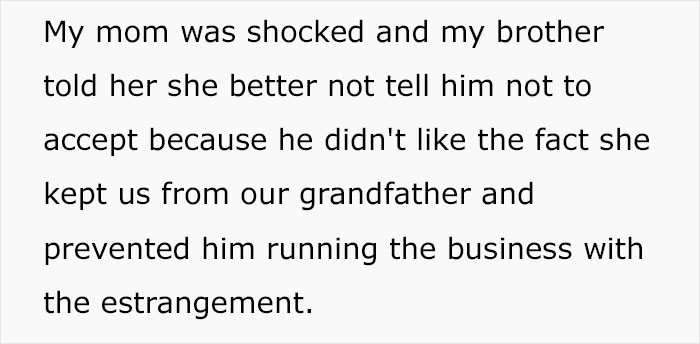








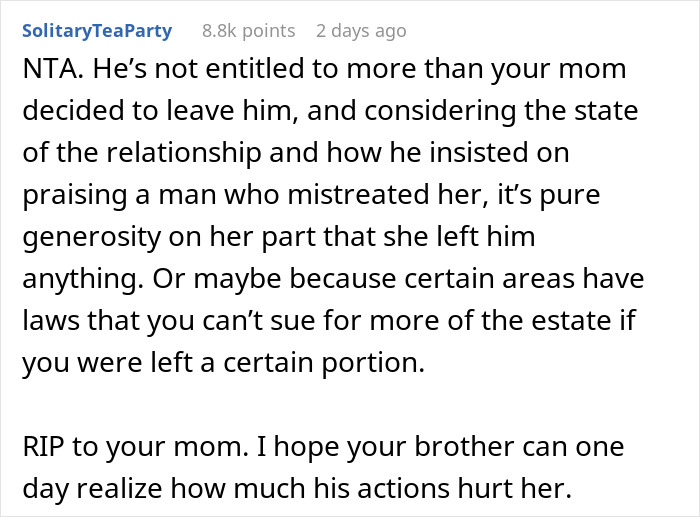
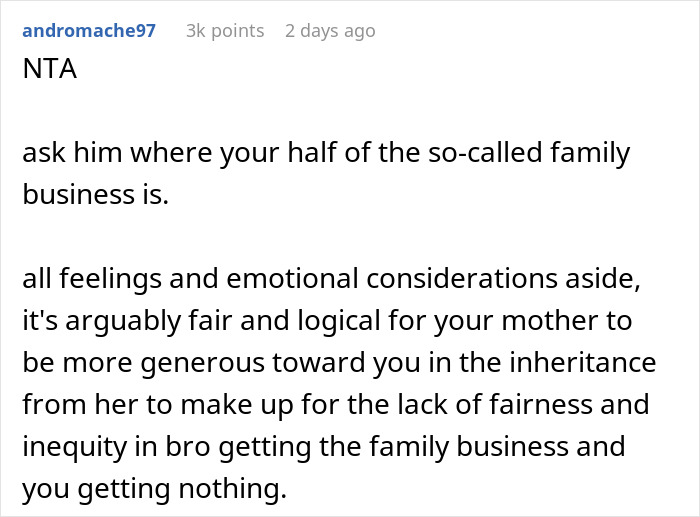




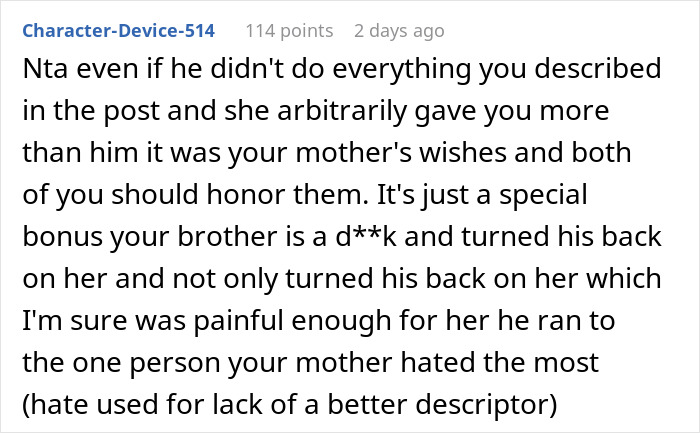


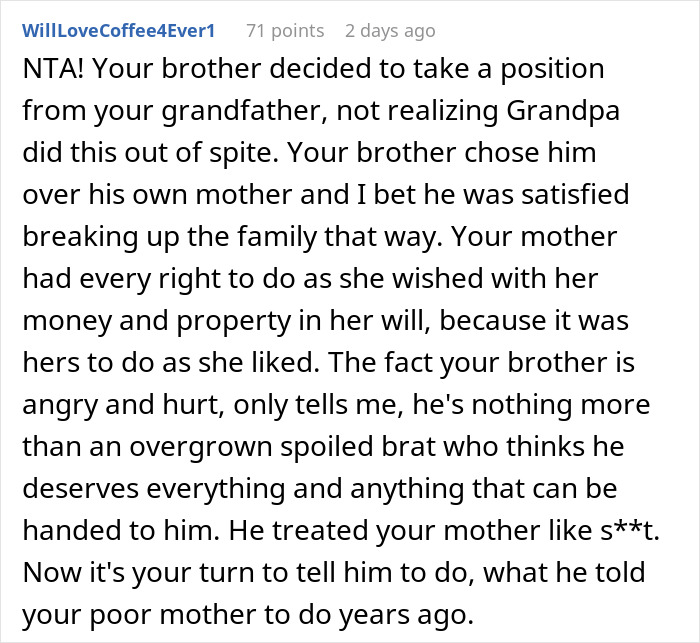




























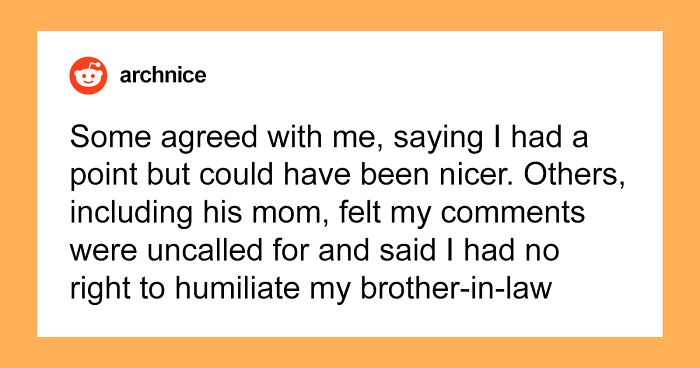
40
53